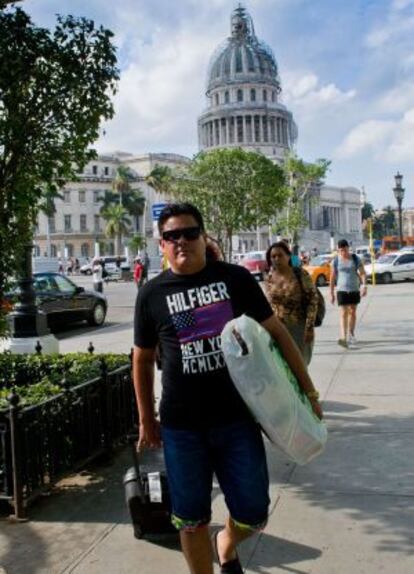Spaniards keen to invest further in Cuba before US lifts trade embargo
A delegation of 43 businessmen is in Havana to discuss expanding opportunities


Taking advantage of the headway provided by decades of doing business in Cuba, Spanish businessmen want to make sure they are well-positioned in the Caribbean island by the time the United States decides to lift its more than 50-year-old trade embargo.
To increase their presence, a delegation of officials from 43 Spanish businesses, which either have already established interests in Cuba or are interested in investing in the island, has accompanied secretary of state for trade Jaime García Legaz on an official trip to Havana.
García Legaz is the highest-ranking Rajoy administration official to travel to Cuba since Foreign Minister José Manuel García-Margallo’s trip in November.
Spanish businessmen believe that opportunities will be expanded once US companies are allowed to set foot on Cuban soil.
García Legaz is expected to host a series of meetings with top Cuban officials, including Council of Ministers vice president Ricardo Cabrisas; central bank president Ernesto Medina; and the ministers of foreign trade and investment, tourism, construction, industry, and energy and mining.
There has been a rush to set up shop in Cuba since the December 17 announcement of the normalization of relations between the United States and Cuba.
Businessmen have questions concerning the repatriation of their earnings and currency exchange
“Spain is well-placed because the majority of the businessmen from the chambers of commerce have maintained their ties to Cuba over political fluctuations,” said one business source.
Even though some doubts remain, there are numerous opportunities for Spaniards on the island. One of their concerns is how far their businesses will be protected under the new foreign investment law, which was passed by Cuba last year.
They also have a lot of questions concerning the repatriation of their earnings, currency exchange policies, and the mandatory requirement to employ local workers through Cuban state agencies.
A duel currency exchange, which is made up of the well-depreciated Cuba peso, and the Cuban Convertible Peso (CUC), which is pegged to the US dollar, complicates the accounting and trade transactions for many businesses.
The majority of Cuba’s 11 million workers are paid in Cuban pesos, but use the CUC to make purchases for certain imported goods. The central bank is rushing against the clock to change these policies that have an effect in the private sector as well as society.
Officials from the Spanish delegation not only represent the tourism, renewable energies and engineering sectors, but also the construction and food industries.
The majority of the Spanish businesses now in Cuba are in the tourism sector. About 90 percent of the country’s four- and five-star hotels are administered by Meliá, which runs 24 Iberostar, Rius, NH and Barceló establishments on the island.
“Cuba is a very interesting market. It is a logistical platform for the Gulf of Mexico and has very well educated people who are just waiting for the occasion to demonstrate it,” said the business source.
Tu suscripción se está usando en otro dispositivo
¿Quieres añadir otro usuario a tu suscripción?
Si continúas leyendo en este dispositivo, no se podrá leer en el otro.
FlechaTu suscripción se está usando en otro dispositivo y solo puedes acceder a EL PAÍS desde un dispositivo a la vez.
Si quieres compartir tu cuenta, cambia tu suscripción a la modalidad Premium, así podrás añadir otro usuario. Cada uno accederá con su propia cuenta de email, lo que os permitirá personalizar vuestra experiencia en EL PAÍS.
¿Tienes una suscripción de empresa? Accede aquí para contratar más cuentas.
En el caso de no saber quién está usando tu cuenta, te recomendamos cambiar tu contraseña aquí.
Si decides continuar compartiendo tu cuenta, este mensaje se mostrará en tu dispositivo y en el de la otra persona que está usando tu cuenta de forma indefinida, afectando a tu experiencia de lectura. Puedes consultar aquí los términos y condiciones de la suscripción digital.








































